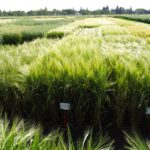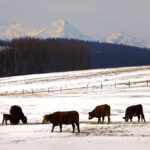
Ameropa to shut malting barley trading firm Interbrau

If you want to dispute a grain grade
If you don’t like the grade at the elevator, you can appeal to the Grain Commission, but most farmers choose to shop around for the best deal

Wheat breeding: Public or private?
Some argue private investment will boost yields, but others note that public breeders have done a pretty good job so far

Halting the feed barley decline
Many growers still take a yield penalty in hopes of a malting premium, but breeders say feed varieties offer advantages

Diversification the name of the game for Lewis Farms
Change Makers: From potatoes to grain to a commercial bull business, Lewis Farms has diversified to manage risk and accommodate market challenges

Federal forecast sees more oilseed acres, less in grains

New in spring cereals
They may not be large-acre crops, but their growers are dedicated

A genetic solution to fusarium?
Across the country, several researchers are studying fusarium from every angle, from pathology to agronomy

Checkoffs to become a checkerboard
The plan is for a single checkoff next August 1, but will different provincial recipients all go in the same research direction?



